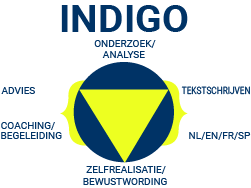In Ervin Laszlo’s latest book, Dawna Jones elaborates in one of the chapters on improving work environments, working relationships and hence the functioning and the output of companies and organisations.
New, more inclusive objectives play a crucial role. ‘Inclusive’ as in fitting seamlessly with the potential of the employees and trying to maximise it.
It is the focus on increasing profits for companies or achieving targets imposed by the authorities within government (and the corresponding measurement systems!), that leads to competition, hardening and mutual distrust (and excesses such as Workplace Bullying). Consequently employees derive less satisfaction from their work. Less satisfaction causes stress. Stress in turn causes disease and sick leave and thus no optimal increase of profits. It is as simple as that.
Objectives, a sense of direction, are vital to everyone. That is to say giving us a sense of meaning, purpose, fulfilment. Therefore (re)formulating objectives, to which employees are happy to commit, provides an excellent way to improve the work environment and thus also the output. Motivating employees with inspiring goals for which they are happy to employ their talents and that make them keen to participate in innovation. Eager to show initiative. Sustainable objectives for which they want to work together, thereby solidifying connectedness. Work pleasure leads to exceptional achievements.
Responsible and Conscious Leadership
This requires more awareness. Self-awareness as well as context-/situation-awareness. This counts for everyone but in this case first and foremost for managers. Self- and context-aware managers, capable of encouraging and supporting employees with their process of awareness, self-optimisation. Responsible leadership, competent of formulating motivating and inclusive objectives. Capable of selecting employees in the right way. Freeing up their human potential and stimulating their talents. Open to their creative contributions. In this way the organisation will automatically transform as well. This in turn has a positive impact on the environment and ultimately society as a whole. Accountable managers that take the responsibility for the consequences of their leadership on employees but also on the context.
The reality is that people mostly engage in self-study, change and awareness after a crisis. Leadership with exceptional vision is required to inspire, motivate, guide and support employees in this direction anyhow!
The Daily Practice
Increased awareness is needed more than ever but fortunately also visible. Not only are new companies and organisations focusing on higher objectives, trying to solve the ever increasing amount of current problems. There are also ever more private initiatives of people seriously concerned about and dedicated to the bigger picture. Big challenges appear to stimulate and bring out the best in people. That positivity motivates others and brings people together. ‘Precepts may lead, but examples draw.’
The advantages of the personal process of awareness spill over in the same way within organisations. Personal awareness leads to a better health, strength, more energy and bliss, inspiration, creativity, eagerness to prove one’s potential. Making you keen to incite others to engage in that same process and achieve similar results. At the same time those ‘more advanced’ in the process of awareness already constitute, by their positive way of being, inspiration to others. Within organisations there will be a same kind of mutual motivational spill-over, stimulating each other and thereby simultaneously improving the work atmosphere and collaboration, inherently transforming the organisation. This in turn attracts more conscious employees. A positive upward spiral so to speak.
Trusting employees also implies more autonomy. Detailing and imposing tasks on adults and strictly controlling them is demotivating and depressing and also causes frustration and stress. Stimulating the talents and initiative of co-workers and investing in mutual relations, on the contrary, produces astonishing results.
On the basis of a cited example the chapter advocates sincerity and integrity as most important character attributes of the successful leader of the future! Plus the courage to remain loyal to one’s own vision.
According to Socrates the secret of change is to focus all of our energy, not on fighting the old but on building the new. Alternatives to superseded institutions and initiatives for new forms of collaboration. For instance by formulating new, motivating, inclusive, higher objectives. For the benefit of employees, their mutual bonds, the organisation and therefore society as a whole.
Maartje Rutten, The Hague, October 14th, 2019

